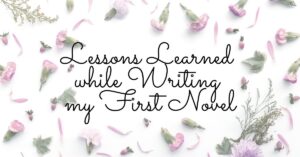The following article may include links to various products/services. Using these links may result in my earning a small commission that helps me keep this site going! Thank you for your support!
In November 2021, I challenged myself to write 50,000 words in 30 days as part of NaNoWriMo. I hit that target in just over half the time, and finished the month with around 60,000 words. I thought I’d share with you lovely people what writing my first novel has taught me thus far.
Becoming a novelist has been a dream of mine for more than half my life, and to see that dream slowly but surely coming to fruition is hard to believe at times. I know there are others like me out there, so I sincerely hope my tips and tricks up to this point will help someone else out there.
Lesson One: Nothing you write is garbage.
I’ve made that claim too many times. If you’ve had a frustrating day, and struggle to get any words written at all, I don’t care if those words are “can I go to sleep now?”
If you sit down and write anything at all, it’s not garbage. It’s another moment to be proud of yourself for working on the habit of regular writing.
Writing my first novel has taught me that habits are so key. And the way you talk to yourself is also a habit! Practice positivity. <3
While working on my second draft, there were a number of scenes I cut because I felt like they didn’t make sense or weren’t necessary anymore, but the time spent writing what doesn’t get used doesn’t equate to wasted time.
Lesson Two: Second drafting is different for everyone.
Perusing various resources trying to figure out “how” to write my second draft proved effectively fruitless. How you write a second draft is entirely dependent on your own writing style and preferences.
Personally, I preferred to have two Word documents open at the time time. My first draft, and my second draft or “working copy”. I literally rewrote my entire novel. Rewriting helps me pick up on errors before I even get to editing, and the practice of reading what I was retyping helped me to make sure things were flowing.
This process helped me expand on different scenes, and make the decision to cut others!
Second drafting is not one size fits all.
Lesson Three: Find professional beta readers.
This is actually where I’m at right now. I hired a professional beta reader on Fiverr, and with one day left to go before they were meant to deliver their notes, they cancelled my order due to overbooking. I took the morning to obsess over the idea that “maybe they cancelled because they started to read my manuscript and hated it” but then I, y’know, actually read the messages.
Now I’m waiting on the next beta to go through my story, and I’m honestly terrified.
HOWEVER, beta reading is important. As much as my family and friends love me, I know they have loads of other things going on. So while I did send a few people my manuscript, I don’t really expect any of them to finish reading it. So why not hire unbiased professionals?
Lesson Four: Budget for your launch.
Now that we’re getting back to some semblance of normalcy in terms of the pandemic, I was fortunate in that I got to attend an event held at my local library where a self-published author was being featured in a talk about how to self publish. From that talk, the most important thing I took away was that these little things add up.
Think about a budget for costs like:
- Beta readers.
- Editors (copy editors, structural editors, or whatever else you feel you might need).
- Cover designers.
- And possibly even formatters. I’m considering having someone format my Word doc so that it’s ready for Amazon KDP (Kindle Direct Publishing) for both an ebook and paperback option.
Sidenote/bonus lesson: prepare for your launch well ahead of when you plan for it to happen! You want to have an audience when you announce to the world that your book is live. Start hyping it up early. Get your social media following excited about it— or just get a social media following to start with!
Lesson Five: Take your time.
Anyone who knows me will vouch for me saying I have no patience at all. It’s killing me waiting for days to go by before my beta gets their feedback to me. I’m definitely not checking the app to see how many days/hours/minutes are left to go…
However, if you want your novel to be successful, you need to take your time. Writing my first novel has been an incredibly personal endeavour for me, as it’s a fictionalized retelling of coping with the untimely and tragic death of my best friend. I want to do right by her, so that’s what’s keeping me from jumping the gun and just hitting publish anyway.
Especially if it’s your first novel, you want to make sure it’s error free and coherent. You want readers to keep an eye out for your future work, and sloppiness won’t make that happen!
Final Thoughts
That’s it for now, folks. There are definitely more where this came from, so check back in the near future for another five lessons learned while writing my first novel! By then I’ll let you know how beta reader feedback looks, and hopefully I’ll be working on the next step: finding an editor!
If you’re struggling to achieve your writing goals, check out my post on how to write when you’re not feeling inspired! If that helps you out, there are plenty more on the same topic on my blog and social media!
